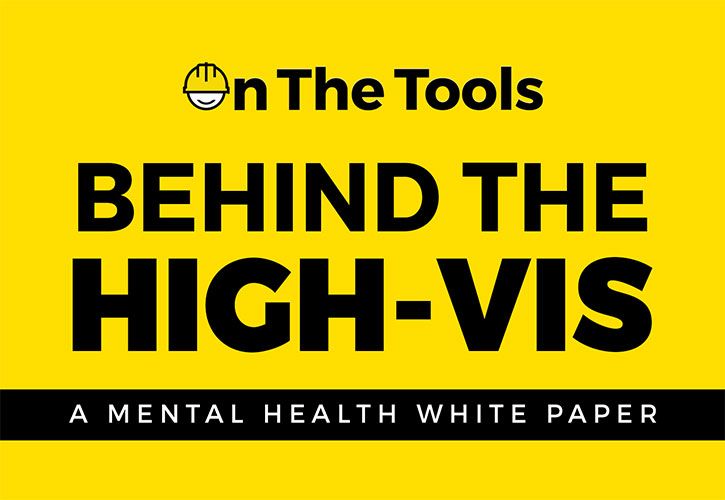UK DIY News
On The Tools: Behind The High Vis - A Mental Health White Paper

- Almost three-quarters (73%) of UK tradespeople surveyed said they are experiencing mental ill health right now or have done so in the past; tradespeople are 26% more likely than workers in other industries to experience mental ill health in the UK.
- Absenteeism due to mental ill health costs the construction industry almost £2.75 billion annually.
- More than 8 in 10 tradespeople who lone work (84%) experience mental ill health.
- 65% of UK tradespeople surveyed reported that their own financial situation directly impacts their mental health.
- 64% of UK tradespeople surveyed reported misusing drugs, alcohol, or both drugs and alcohol in an attempt to mitigate symptoms of mental ill health.
- Almost half (48%) of UK tradespeople surveyed told us they knew at least one person who has left the industry due to mental ill health.
A new report has revealed that 93% of UK tradespeople have been impacted by mental ill health in some way, with 73% of all UK tradespeople surveyed experiencing mental ill health right now or in the past. A further 20% hadn’t personally experienced mental ill health but knew another tradesperson who had.
Behind the High-Vis: a Mental Health White Paper has been created by the UK’s largest and most engaged construction community, On The Tools, and supported by Band of Builders, Construction Sport, Dulux Academy, Dulux Select Decorators, Speedy, and TVL security, with useful input from other partners and case study participants, to explore the full scale and impact of mental ill health in the construction industry, as well as make informed recommendations to reduce the issue.
Timed to coincide with Mental Health Awareness Week (Monday 15th May 2023 to Sunday 21st May 2023), Behind the High-Vis: a Mental Health White Paper highlights the particular prevalence of anxiety, the theme and focus of this year’s Mental Health Awareness Week, with 62% of UK tradespeople surveyed reported experiencing anxiety.
Download the report here
Those impacted
The white paper highlights that age, trade type, gender, length of employment and level of seniority can affect the likelihood of a tradesperson experiencing mental ill health. Half of UK tradespeople surveyed who have experienced mental ill health have mid-level positions and 100% of UK general builders/multi-trades surveyed reported experiencing depression and/or anxiety. Of the UK tradeswomen surveyed, 28% were more likely to experience mental ill health than their male counterparts.
The causes
The most common factor that directly impacts a tradesperson’s mental health is their own finances, with 65% highlighting it as a contributing issue. The research also found that trade-specific factors, such as lone working, impacted a tradesperson’s mental health. In particular, the findings show that 84% of tradespeople who lone work experience mental ill health, predominantly depression and anxiety.
The effects
The most frequent symptom experienced by UK tradespeople surveyed is low motivation; 69% of UK tradespeople surveyed reported experiencing low motivation as a symptom of their mental ill health and 64% of UK tradespeople surveyed reported misusing drugs, alcohol, or both drugs and alcohol in an attempt to mitigate these symptoms of mental ill health. One anonymous survey participant said: “I felt like I didn’t want to eat, so I struggled because I had no energy. Then I wouldn’t sleep well. I’d get slower and slower. The standard of my work dropped. I just didn't want to be there.”
The report also explores the effects of mental ill health beyond tradespeople themselves with economic repercussions. On The Tools found that absenteeism due to mental ill health costs the construction industry almost £2.75 billion annually. Combined, the UK tradespeople surveyed had missed 2631 weeks (equivalent to 50 and a half years) of work in 2022 due to mental ill health.
The support
Just under half (47%) of UK tradespeople surveyed reported they felt either somewhat or completely unsupported by their workplace(s) when experiencing mental ill health. Comparably, only 28% stated they felt somewhat or completely unsupported by their workplace(s) when they were experiencing mental ill health.
However, there are measures that businesses can put in place to ensure that UK tradespeople experiencing mental ill health feel more supported at work. For example, 41% of all UK tradespeople surveyed reported that they would find the provision of free counselling by their workplace(s) to be a helpful system to support them when they experience mental ill health.
Commenting on the findings of the whitepaper, CEO and Co-founder of On The Tools, Lee Wilcox, said: “There has been an alarming increase in mental ill health among the UK population for some time now. While significant steps have been made, and mental health is starting to be treated as seriously as physical health, it seems only recently that men as a demographic have been able to openly share their experiences with mental ill health to the extent they deserve. In an industry that men currently dominate, it’s no wonder that the construction sector is behind the times when treating our workforce’s mental health.
“This report proves, among other things, that untreated mental ill health has cost the UK a healthy and motivated construction industry workforce. The scale of this issue is now too pressing for the UK Government to ignore. We hope that the findings and recommendations of this report can enact real change and improve the health of our tradespeople.”
This white paper was supported by Band of Builders, Construction Sport, Dulux Academy, Dulux Select Decorators, Speedy, and TVL security: with useful input from other partners and case study participants.
Download the report here
Source : On The Tools
Insight provides a host of information I need on many of our company’s largest customers. I use this information regularly with my team, both at a local level as well as with our other international operations. It’s extremely useful when sharing market intelligence information with our corporate office.











































